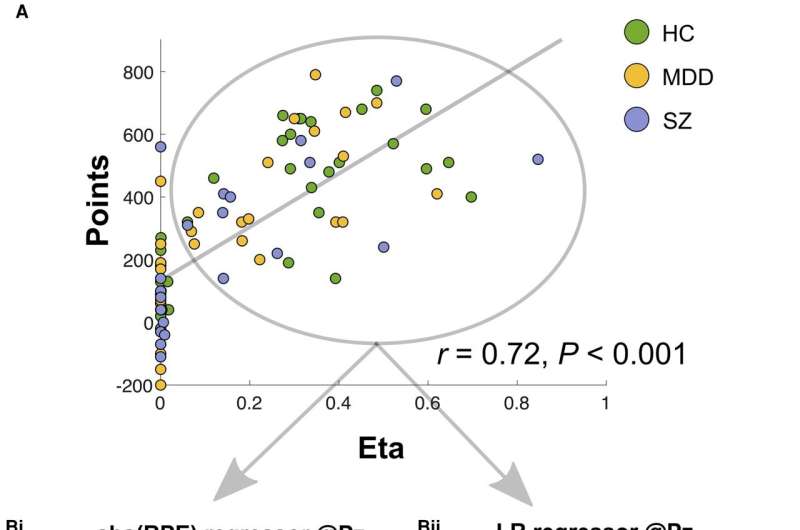This article has been reviewed according to Science X's editorial process and policies. Editors have highlighted the following attributes while ensuring the content's credibility:
fact-checked
peer-reviewed publication
proofread
Why does depression cause difficulties with learning?

When learning, patients with schizophrenia or depression have difficulty making optimal use of information that is new to them. In the learning process, both groups of patients give greater weight to less important information and, as a result, make less than ideal decisions.
This was the finding of a several-months-long study conducted by a team led by neuroscientist Professor Dr. med. Markus Ullsperger from the Institute of Psychology at Otto von Guericke University Magdeburg in collaboration with colleagues from the University Clinic for Psychiatry & Psychotherapy and the German Center for Mental Health.
By using electroencephalography (EEG) and complex mathematical computer modeling, the team of researchers discovered that learning deficits in depressive and schizophrenic patients are caused by diminished/reduced flexibility in the use of new information.
The study has just been published in Brain and is titled "Transdiagnostic inflexible learning dynamics explain deficits in depression and schizophrenia."
"People with depression or schizophrenia often suffer from cognitive limitations," says the lead author of the study, Dr. Hans Kirschner. For example, they find it difficult to understand complex information, to learn, to plan or to generalize a situation. "In particular, deficits in using feedback from the past to manage future behavior, poses a fundamental problem for those affected."
Dr. Tilmann Klein, neuropsychologist and psychotherapist adds that these cognitive limitations are very onerous for the affected groups of patients and have a strong influence on the outcome of treatment. "If we understand these deficits and their causes better, in the long term we can design forms of treatment such as functional training to be more specific and targeted."
To find out whether the psychological and neuronal mechanisms that lead to cognitive limitations are the same in different mental disorders, the scientists examined patients with a diagnosis of a severe depressive disorder and of schizophrenia as well as a control group comprising 33 people.
The test subjects were repeatedly presented with images of animals on a screen that were associated with either a high or low probability of reward or punishment, that is positive or negative feedback. The test subjects had to decide whether they wanted to bet on the animal or not, and thus either win or lose 10 points. If they did not bet, they neither won nor lost anything, but would then see what would have happened, had they opted to bet.
Dr. Kirschner describes the test setup as follows: "During the experiment, the objective for the participants was to find out whether it was worthwhile betting and therefore risking the loss that might entail, or if it was better not to bet and thus avoid losing."
"The process is a little bit like a game of roulette," explains the neuroscientist. "If you place your bet, you either win or lose. If you do not bet, you nevertheless get to see where the little ball ends up and you can work out what would have happened if you had placed a bet. The difference in our study is that the participants were actually able to learn because over time they came to realize if an animal was more likely, on average, to be rewarded or punished and could then either always bet on the animal and thus maximize their winnings or minimize their losses."
According to Kirschner, optimal learning in this task would mean that the test subjects took more note of the feedback—i.e., the wins or losses of an animal—at the beginning of the learning process. "Once they have a feel for an animal's likelihood of winning, they ignore misleading feedback, for example, a picture that usually is highly likely to lose also wins occasionally."
While healthy control participants did exactly this, the patient groups that were suffering from depression or schizophrenia were more strongly influenced by randomly occurring errors. "Imagine a basketball player throwing balls at a basket," Dr. Kirschner goes on to say. "A poor player scores rarely and is not picked for the team. Even if they do not score every time, a good player scores often and is therefore picked for the team. However, in the study, both groups of patients would replace the good player after a poor shot."
In the EEG it could be seen that both patient groups have a diminished neuronal representation of reward expectation. "This means that the scoring rate of a good basketball player is not stored as well in the brain and is more quickly overwritten, when the player occasionally fails to score."
In summary, Dr. Kirschner explains that the study expanded the team's knowledge of cognitive limitations in patients with a diagnosis of schizophrenia or depression. "In particular we were also able to demonstrate the benefits of computer models in which we attempt to describe complex learning mechanisms mathematically and implement them in the form of computer simulations."
This made it possible to simulate hard-to-predict learning behavior and compare it with the behavior of participants in specific tasks. "With this approach in [the] future, we will be able to quantify and characterize learning deficits in a more nuanced way. And a better understanding of these deficits will, in turn, help direct us towards further developing existing treatments for depression and schizophrenia in a more targeted way. We hope that in future our research will benefit patients affected by learning impairments and help them to cope better in their everyday lives."
More information: Hans Kirschner et al, Transdiagnostic inflexible learning dynamics explain deficits in depression and schizophrenia, Brain (2023). DOI: 10.1093/brain/awad362


















